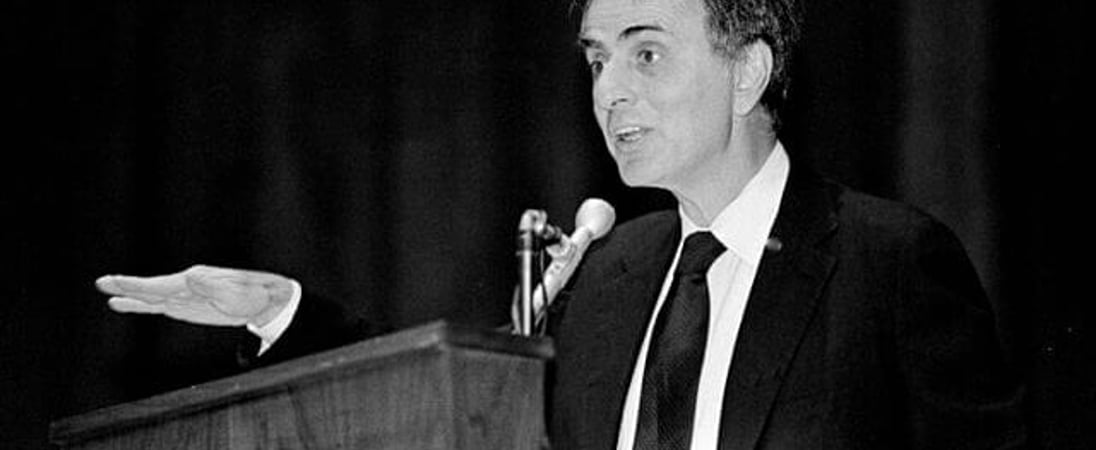
Carl Sagan's birthday
Carl Sagan was a famous scientist who helped everyone understand the stars and the universe. He was like a tour guide for space, teaching people through his books and TV shows.
Born on November 9, 1934, in Brooklyn, New York, he grew up with a big imagination and a dream to learn all about the stars and planets.
From being a curious kid who loved to read about space, Carl became a star scientist. He went to college in Chicago and worked hard, eventually becoming a professor and winning big awards for his writing.
Even though he was a serious scientist, he had a special talent for talking about space in a way that was fun and easy for anyone to understand.
Carl Sagan’s story is not just about a man who learned a lot about space. It’s about someone who shared his knowledge and excitement with the whole world. He showed us that the universe is full of wonders and that science is a way to discover them.
Early Life and Childhood
Born on November 9, 1934, in Brooklyn, New York, Carl Sagan’s fascination with the stars began early. His inquisitive nature was evident even as a young boy when he first learned that the stars were suns, each potentially with their planetary systems.
This early realization sparked a lifelong passion for the universe and set him on a path to becoming one of the most influential astronomers of the 20th century.
Sagan’s educational journey started with a burning desire to understand the cosmos. He immersed himself in science fiction and astronomy books, which laid the foundation for his later studies.
Sagan earned a bachelor’s degree from the University of Chicago in 1954, followed by a master’s degree and a Ph.D. in astronomy and astrophysics. His academic prowess set the stage for a distinguished career that would make him a household name.
Carl Sagan’s Achievements
Significant achievements marked Carl Sagan’s professional life. He contributed to understanding planetary atmospheres, particularly the greenhouse effect on Venus, and conducted pioneering work on the possibility of life on other planets. His research on the surface conditions of Mars was crucial in the planning of NASA missions to the planet.
Beyond his scientific contributions, Sagan became one of his time’s most influential science communicators.
He wrote the best-selling book “Cosmos,” adapted into a thirteen-part PBS television series, bringing science into the living rooms of millions of viewers. His talent for explaining complex scientific concepts in an accessible and entertaining manner made him an iconic figure in popular culture.
Sagan played a crucial role in the space exploration narrative. He was a part of the team that sent messages into space with the Pioneer plaque and the Voyager Golden Record—time capsules of humanity’s culture and life on Earth in the hopes of being discovered by extraterrestrial life.
As a professor, Sagan influenced generations of scientists. His academic work at Harvard University and Cornell University is still revered. He published over 600 scientific papers and authored or co-authored more than 20 books. His book “The Dragons of Eden,” won the Pulitzer Prize.
Carl Sagan’s achievements transcended his life, continuing to influence science and culture. His dedication to education and exploration encouraged people to ask for responses.
Interesting Facts About Carl Sagan
Carl Sagan’s contributions to science and culture were manifold, and his life was filled with intriguing facets:
Space Messages Creator: He was instrumental in creating the Pioneer plaque and the Voyager Golden Record, messages to potential extraterrestrial beings launched into space.
Pulitzer Prize Author: Sagan was a prolific author and won the Pulitzer Prize for his book “The Dragons of Eden.” In this book, he discusses the evolution of human intelligence.
Catchphrase Popularization: His phrase “billions and billions” became associated with him thanks to his distinctive way of emphasizing the vastness of the universe.
Cornell University Professor: Sagan was a professor of astronomy at Cornell University. He was also a driving force in establishing the SETI (Search for Extraterrestrial Intelligence) Institute.
Scientific Skepticism Proponent: An advocate for scientific skepticism and the scientific method, Sagan was a founding member of the Committee for Skeptical Inquiry.
Sagan’s work is remembered and easily accessible for those who wish to delve into it. His extensive writings and television series still remain popular. In addition, his thoughts on the cosmos continue to be shared by admirers worldwide.
Carl Sagan’s legacy is one of knowledge, wonder, and a profound love for science. He expanded our understanding of the universe and showed us the beauty and excitement in the pursuit of knowledge. Carl Sagan was a luminary of the cosmos whose light continues to shine bright.
Also on this date...
National Fried Chicken Sandwich Day
Picture the crispiest, juiciest, most delicious bite you've ever taken - that's what you'll get with this mouth-watering sandwich!
Carl Sagan Day
A unique mind, Carl Sagan offered the world a variety of new discoveries in science as well as new ways to think about the world.
World Freedom Day
Commemorate the fall of the Berlin Wall and the Iron Curtain on World Freedom Day and call for liberty everywhere through protest and political activism.




